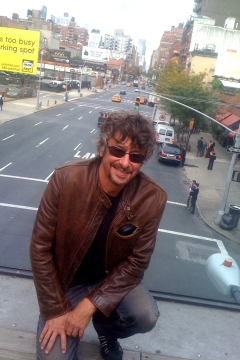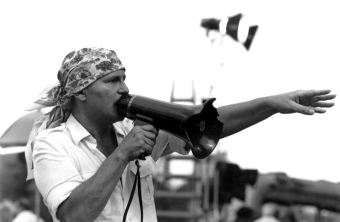PRESS RELEASE
57th THESSALONIKI INTERNATIONAL FILM FESTIVAL
November 3-13, 2016
TRIBUTES
PHILIPPE GRANDRIEUX / LEONARDO FAVIO
57th THESSALONIKI INTERNATIONAL FILM FESTIVAL
November 3-13, 2016
TRIBUTES
PHILIPPE GRANDRIEUX / LEONARDO FAVIO
Two renowned filmmakers with a completely different body of work, albeit sharing their common passion for telling powerful stories through film, are being honored in the tributes of this year’s edition. The 57th Thessaloniki International Film Festival welcomes avant-garde French filmmaker Philippe Grandrieux to Thessaloniki, where he will present his films. In addition, TIFF has the pleasure to introduce to the Greek audience the work of the versatile Argentinean artist Leonardo Favio (1938-2012), who remains largely unknown outside his country.
Philippe Grandrieux tribute
 Director and writer Philippe Grandrieux was born in 1954. His work includes feature films, video art, documentary, as well as museum and gallery installations and it has been presented in numerous festivals and art venues around the world.
Director and writer Philippe Grandrieux was born in 1954. His work includes feature films, video art, documentary, as well as museum and gallery installations and it has been presented in numerous festivals and art venues around the world.Grandrieux’s work is radical and subversive; it challenges cinematic rules and establishes its own, immersing in a profound exploration of image, sound and narrative structures, expressing thus the filmmaker’s uncompromised vision. Drawing both on genre movies and experimental film, Grandrieux’s films are principally driven by the human senses, offering the viewers truly intense sensorial experiences and a deep psychological involvement.
The filmmaker uses the human body as the medium to unfold intense sensual stories that often explore both the dark and delicate side of the human soul. His latest film Despite the Night (2015) is a nightmarish psychodrama that employs the filmmaker’s trademark close-ups on the faces and bodies of the film’s characters, who drift into a dangerous pornographic underworld forced by the desire to seek comfort for their extreme suffering.
Part of Grandrieux’s “anxiety trilogy”, the film installations Meurtriere (2015) and White Epilepsy (2012) expose the primitive and erotic nature of the human body as part of an idiosyncratic choreography. The latter initiates the viewer into an powerful cinematic experience of agony and ecstasy, ultimately posing the question “is this a dream or a nightmare?”.
In the documentary It May Be that Beauty Has Strengthened Our Resolve – Masao Adachi (2011) Grandrieux pays a respectful and compelling homage to the revolutionary Japanese artist, with whom he feels they share certain elective affinities. Adachi reveals his thoughts, emotions, confessions and memories on camera, in this idiosyncratic intimate portrait about film, art and politics.
Set in a snowy dense forest, A Lake (2008) centres on a tight-knit family whose fragile balance is disturbed by the arrival of a stranger in their secluded home. Passion and isolation take centre stage in the film, as the extreme close-ups and sound design set the tone in yet another of Grandrieux’s dark celebration of the senses.
A New Life (2002), an experimental chronicle of the impetuous relationship between a tourist and a prostitute, tackles sexuality, violence, moral collapse and human trafficking in Eastern Europe, through a variety of visual styles.
In Grandrieux’s debut Sombre (1998) -featuring original music by Suicide’s Alan Vega-, a serial killer travels through France and stalks two sisters, forming a peculiar relationship with one of them. Sparse dialogues and elliptical narrative, intense sexuality and raw, dark images also define this film, marking the forerunner of Grandrieux’s cinematic universe; one that defies conventions and transforms films into experiences the viewers can engage in with all their senses.
The Films:
Sombre, France, 1998, 112΄
A New Life / La vie nouvelle, France, 2002, 102΄
A Lake / Un lac, France 2008, 90΄
It May Be that Beauty Has Strengthened Our Resolve - Masao Adachi / Il se peut que la beaute ait renforce notre resolution - Masao Adachi, France, 2011, 74΄
White Epilepsy, France, 2012, 68΄
Meurtriere, France, 2015, 63΄
Despite the Night / Malgre la nuit, France, Canada, 2015, 156΄
Leonardo Favio tribute
 Argentinean filmmaker and musician Leonardo Favio (1938-2012) was one of the most iconic and multifaceted artists of Latin America. A prolific director and actor, as well as a singer and songwriter, he stood among the most favoured cultural figures of the continent. Seven of his films will be screened in the 57th TIFF’s tribute.
Argentinean filmmaker and musician Leonardo Favio (1938-2012) was one of the most iconic and multifaceted artists of Latin America. A prolific director and actor, as well as a singer and songwriter, he stood among the most favoured cultural figures of the continent. Seven of his films will be screened in the 57th TIFF’s tribute. Born in 1938 in the Mendoza province as Fuad Jorge Jury, of Syrian origin, Favio had a troubled childhood, marked by his father leaving the family home, and he often faced troubles with the law. He began his career as a voice actor on radio and later moved to Buenos Aires where he starred in several films –most of which directed by his mentor, filmmaker Leopoldo Torre Nilsson-, while he also gained the reputation of the Argentinean James Dean. At the end of the 50s he ventured into film direction, as a self-taught filmmaker. At the same time, he had a very successful career in music. A passionate supporter of Argentina's former leader, Juan Domingo Peron, Favio was exiled in Colombia after the 1976 coup and returned to Argentina in 1987.
Favio’s cinema is humanistic and filled with emotions, capturing exceptionally the Argentinean psyche. It is also hard to be classified, as it varies between different film genres. Many of his films are among the most influential in the Argentinean cinema. His fascinating debut Chronicle of a Lonely Child (1965) evokes Bresson, Bunuel and Italian neorealism; it is the semi-autobiographical portrait of Polin, a young boy whose life shatters between the reformatory and the poor district where he lives. Another Argentinean classic, El romance del Aniceto y la Francisca (1967), based on a short story written by Favio’s brother Jorge Zuhair Jury, is a powerful insight into human passion, seduction and regret, through a bitter love story set in the provincial part of the country.
In Juan Moreira (1973) Favio recounts the adventures of the legendary Argentinean folk hero of the same name who fought against suppression and injustice, reflecting thus the country’s political situation and the re-establishment of Peronism at the time. The Nazarene Cross and the Wolf (1975), Favio’s most popular and commercial film -a big box-office hit in Argentina-, is a subversive take on the werewolf myth, centred on a love story doomed by a terrible curse. To Dream, To Dream (1976) is a tender, subtly ironic road movie that records the struggles of two artists who want to rise to fame.
In Gatica, el mono (1993), Favio pays tribute to another prominent Argentinean figure; the boxer Jose Maria Gatica. The film unfolds his life from poverty to glory, reaching to the tragic epilogue of his sudden death. In 2008 Favio directed his swan song Aniceto, a remake of his earlier film El romance del Aniceto y Francisca. Two years before his death, he was appointed Argentina’s Ambassador of Culture by the country’s former President Cristina Fernandez de Kirchner; another token of recognition for an artist who forms such a significant part of the Latin American culture.
The Films:
Chronicle of a Lonely Child / Cronica de un nino Solo, Argentina, 1965, 80’
El romance del Aniceto y la Francisca, Argentina, 1967, 61’
Juan Moreira, Argentina, 1973, 100’
The Nazarene Cross and the Wolf / Nazareno Cruz y el lobo, Argentina, 1975, 85’
To Dream, To Dream / Sonar, Sonar, Argentina, 1976, 80’
Gatica, el mono, Argentina, 1993, 138’
Aniceto, Argentina, 2008, 78’














